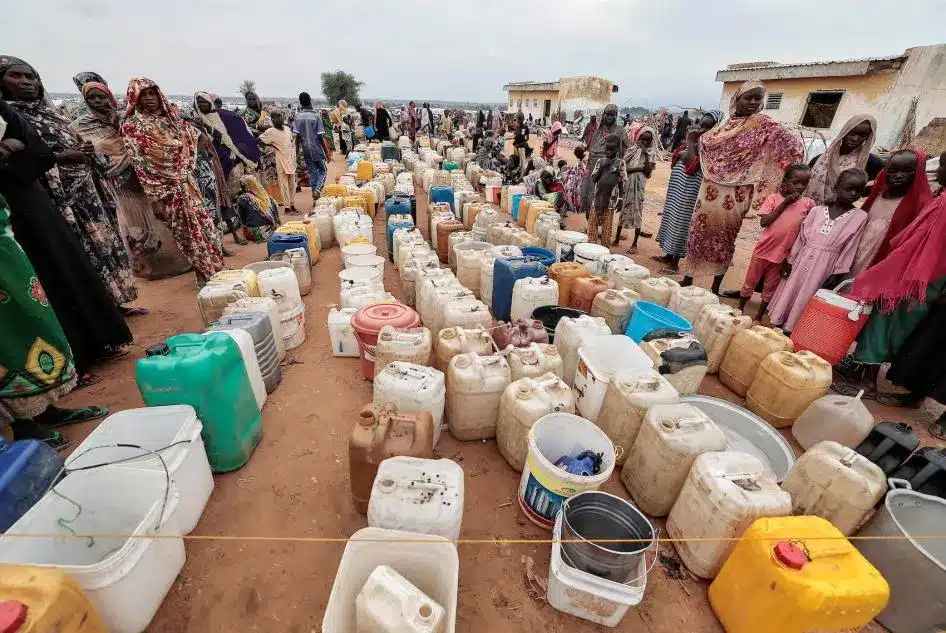Sudan’s Hunger Crisis: A Call for Action

Hunger and starvation are escalating in Sudan, driven by ongoing conflict and poor decision-making. United Nations officials recently addressed the Security Council, emphasizing the urgent need for a ceasefire and the removal of barriers to humanitarian aid. Edem Wosornu, Director of Operations and Advocacy Division at the Office for the Coordination of Humanitarian Affairs, described the situation as a “man-made crisis.” The Integrated Food Security Phase Classification (IPC) report reveals alarming famine conditions in five areas, including Zamzam and Al Salam camps. The report predicts that additional regions in North Darfur will face famine by May, with 17 other areas at risk.
Since the outbreak of violence in 2023, over 11.5 million people have been displaced within Sudan, while more than 3.2 million have fled to neighboring countries. Humanitarian workers are putting their lives on the line to deliver aid. Tragically, three World Food Programme (WFP) workers were killed in an airstrike last month. Despite these dangers, a significant UN convoy recently delivered food and supplies to Khartoum, marking a rare success amid the chaos. However, new restrictions in Darfur are complicating humanitarian efforts, with delays in truck inspections and visa approvals for aid workers.
Urgent Need for Humanitarian Access
The UN officials stressed the critical need for unimpeded access to humanitarian aid. Wosornu urged the Security Council to pressure conflicting parties to adhere to international humanitarian law. She called for an immediate cessation of hostilities and genuine steps toward lasting peace. All routes for relief supplies and humanitarian personnel must remain open. The 2025 Sudan Humanitarian Needs and Response Plan requires a staggering $4.2 billion to assist nearly 21 million people. An additional $1.8 billion is needed for 5 million people in neighboring countries.
Beth Bechdol, Deputy Director-General of the UN Food and Agriculture Organization (FAO), echoed these sentiments. She highlighted the ongoing famine in Zamzam camp and warned that conditions are worsening. The persistent violence and economic instability have disrupted markets, driving prices of essential goods to unaffordable levels. With nearly two-thirds of the Sudanese population reliant on agriculture, the loss of vital crops has resulted in billions of dollars in economic damage. The FAO aims to support over 14 million people in 2025 by providing seeds, livestock feed, and fishing supplies to help them produce their own food.
International Response and Responsibility
During discussions, Security Council members emphasized the urgent need for a ceasefire and respect for international humanitarian law. They called for the removal of bureaucratic obstacles that hinder aid delivery. Many representatives recalled Sudan’s agricultural history, expressing alarm at how the conflict has transformed the country from a regional breadbasket into a site of extreme hunger. Even during harvest season, millions are facing starvation.
The UK representative highlighted the responsibility of the warring parties to prevent further deterioration of the crisis. He welcomed the Sudanese Armed Forces’ agreement to establish humanitarian supply hubs but called for more hubs in areas controlled by the Rapid Support Forces. Greece’s delegate stressed the need for guaranteed access to famine-stricken areas, urging the removal of administrative barriers. Denmark’s representative underscored the Council’s duty to act, stating, “We cannot sit idly by as civilians starve before our eyes.”
Sierra Leone’s delegate emphasized that halting hostilities is crucial to mitigating the risk of famine. He called for an end to foreign interference and support for warring factions, asserting that a lasting solution requires respect for Sudan’s sovereignty.
Controversies Surrounding the Famine Classification
The discussion around Sudan’s hunger crisis has not been without controversy. Some Council members, including representatives from Russia and Pakistan, questioned the IPC’s findings, suggesting that the issue of hunger is being politicized. They argued that the report’s conclusions are speculative and do not accurately reflect the situation on the ground. The Sudanese government has also expressed skepticism about the IPC’s methodology, claiming that only 1% of the population is affected by famine.
Despite these disputes, many representatives stressed the importance of acknowledging the severity of the crisis. France’s delegate pointed out that over half of Sudan’s population faces acute food insecurity. The need for rapid and unrestricted humanitarian access is paramount. Panama’s representative expressed surprise at the indifference shown towards the conflict, while the Republic of Korea urged respect for the IPC’s findings.
The Sudanese government has claimed to have restored stability in several areas and has facilitated humanitarian access. However, they also pointed to the Rapid Support Forces as the primary violators of humanitarian principles. The ongoing debate highlights the complexities of addressing the crisis and the urgent need for a unified international response to alleviate the suffering of millions in Sudan.
Observer Voice is the one stop site for National, International news, Sports, Editor’s Choice, Art/culture contents, Quotes and much more. We also cover historical contents. Historical contents includes World History, Indian History, and what happened today. The website also covers Entertainment across the India and World.

